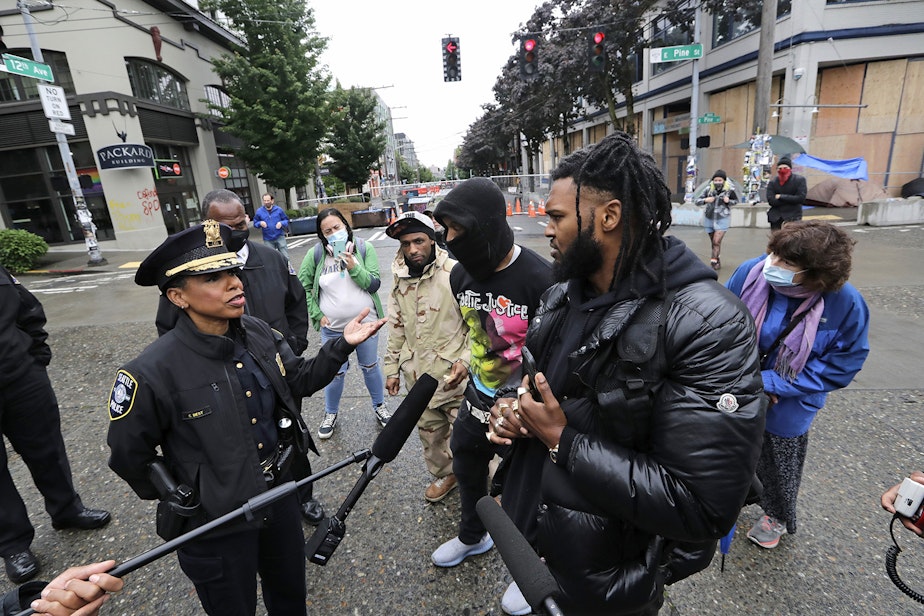Judge: Suit can go forward against SPD, others in sex trafficking case involving Raz Simone

Editor’s note: This story contains descriptions of sexual assault and sex trafficking.
The Seattle Police Department’s handling of a sex trafficking investigation into a local hip-hop artist may have further emboldened the man to harm more people, a judge ruled Tuesday, allowing a lawsuit against the musician, the police department, and the city to move forward.
King County Superior Court Judge Melinda Young said the police have a responsibility not to cause or contribute to “foreseeable harm.” But a police detective told Simone about the pending investigation, potentially providing him with a sense of impunity that may have resulted in “an escalation in vicious behavior,” Young wrote.
Now, what Seattle Police did and did not do while investigating a series of allegations against Solomon “Raz” Simone will be probed in a trial set for next year. The department’s actions are part of a high-profile civil lawsuit filed by five women last year against Simone, his record label, and other associates. Four of the women allege they were forced into stripping and sex work in Seattle and other cities for Simone.
The case against Simone, spotlighted in a recent investigation by KUOW and The Seattle Times, has raised questions about how sex trafficking cases are handled and the consequences for victims when allegations aren’t pursued.
Sponsored
Beginning in 2017, at least eight people — six women and the parents of two others — told Seattle Police that Simone had physically and emotionally abused women, set and collected $1,000 daily quotas, and at times confined women in small sleeping pods at his office space. Women provided police with extensive testimony, emails, text messages and videos, which were reviewed by KUOW and The Times.
Sponsored
But a Seattle detective said the case was unlikely to move forward without a teenage victim, despite no such legal requirement.
The allegations languished for years, and only when another woman spoke to police in late 2020, after Simone gained national attention for his role in the Capitol Hill Organized Protest zone, or CHOP, did police send a case to prosecutors. Even then, police told prosecutors they did not believe a case should be pursued, and King County prosecutors agreed.
Without intervention from the criminal legal system, five women turned to the civil courts, suing Simone for lost wages and medical bills due to harm they allege resulted from being trafficked and abused, and the city and police department for its failures in handling the investigation, causing further harm, the suit says.
The city sought to be dismissed from the lawsuit, saying under state law it could not be sued for a negligent investigation, and that such a suit could have a “chilling effect” on all police work.
Judge Young agreed with the city that a negligent investigation alone is not a credible basis for legal action because government agencies are legally protected from liability while doing work for the general public. However, government agencies, including the police, are bound to a larger duty not to act in a way that contributes to further harm, Young wrote.
Sponsored
The plaintiffs’ case alleges that police action may have caused more harm than if they had done nothing at all, and Young agreed. The ruling hinges in part on a meeting between veteran Det. William Guyer and Simone at a coffee shop in 2017, soon after women first spoke to Guyer.
After the meeting, Simone sent hundreds of text messages to Guyer, records obtained by KUOW and The Times show. Simone told KUOW last year his impression was that police believed the case was “a mess.”
Young said this meeting between police and Simone, and the allegations that it put women in more danger, is a “reasonable inference” that the court accepts.
Ellery Johannessen, a lawyer representing the women, told Young in an Oct. 21 hearing that Seattle detectives’ conduct served as a tacit endorsement of Simone’s actions and “in fact emboldened him to continue his trafficking enterprise.”
One woman told reporters and her attorney she was trafficked by Simone for a year beginning in February 2017. In the months after police first learned of Simone’s alleged crimes, but did not intervene, the woman said Simone starved her, confined her in a sleeping pod, beat her when she did not comply with his orders and choked her so forcefully while raping her that blood vessels burst in her eyes, according to the lawsuit.
Sponsored
Young said the court’s role at this point in the case is to assume the validity of the allegations.
The city has the opportunity to appeal the decision, but declined to comment Tuesday, citing the pending litigation.
Johannessen said he sees the decision as part of a national trend “of acknowledging the lived experience of survivors and really giving them a voice.”
While Washington was the first state to pass anti-trafficking laws nearly 20 years ago, it has been slow to take criminal action; has misidentified or arrested victims; and struggled to train law enforcement and judicial officials.
In the past nine years, Seattle Police referred to prosecutors just two cases that explicitly cite human trafficking, and both were declined for insufficient evidence. Just over 1% of all cases it opened for sex crimes have included the charge of human trafficking. Most cases referred to prosecutors involve crimes against children, which don’t require the evidence needed to bring a case involving an adult trafficking victim.
Sponsored
This case, Johannessen said, could provide victims “an avenue to pursue their claims against whoever might be responsible, including law enforcement agencies that failed to live up to their obligations.”

